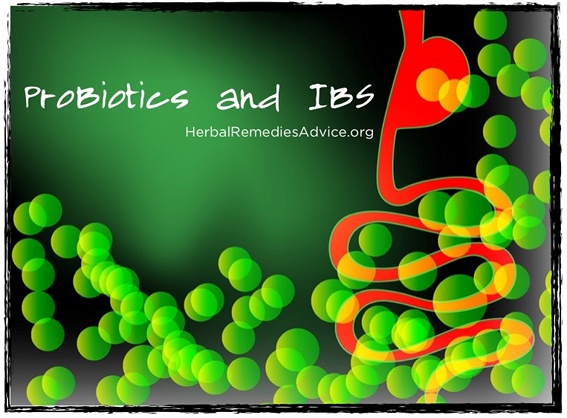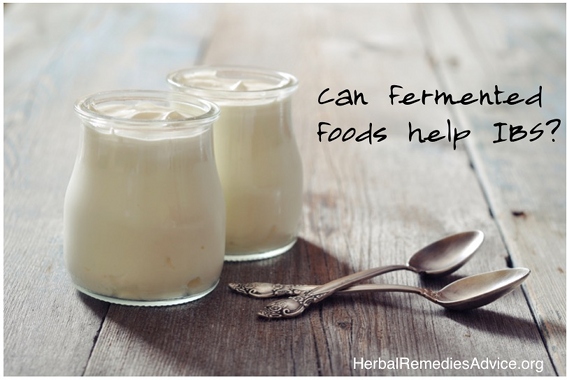Get weekly tips, recipes, and my Herbal Jumpstart e-course! Sign up for free today.

Probiotics and IBS
Share this! |
|
|
This article on probiotics and IBS is the fifth article in my series on Irritable Bowel Syndrome. This article will briefly discuss our growing understanding of our intestinal microbiome. We’ll specifically look at how to use probiotics for IBS as well as the best probiotics for IBS. |
In the past decades, researchers, practitioners and health enthusiasts have gone crazy over gut flora.
It is pretty amazing to think about. There are more bacterial cells in your intestines than there are total cells in your own body, prompting some people to ask: what exactly is it to be a human?
Our growing understanding and appreciation of this microbiome further disrupts our cultural idea that we as humans are separate beings from everything else on this earth. The more we know the more we realize the obvious. We are all connected right down to the organisms in our intestines!
I’ve seen many people diagnosed with IBS benefit from using probiotics for IBS symptoms. However, our understanding of this complex microbiome is still developing. Ed Yong recently wrote an article in the New York Times about how our gut flora is constantly shifting, which prompted him to claim there is no such thing as a healthy microbiome.
While probiotics for IBS can be helpful I want to remind you that there is rarely one magic bullet solution to any chronic health problem. Probiotics and IBS may be an important part of your individual health puzzle, but there are most likely other important aspects as well.
A Brief Review of This Series
In part one we gained a basic understanding of Irritable Bowel Syndrome. In part two we looked at how a holistic health perspective works by addressing the individual and not just the disease. In part three we looked at the importance of diet in relationship to IBS. In part four we looked at the various ways herbs can be used for IBS.
In this article we look at probiotics and IBS as well as the best probiotics for IBS.
What are Probiotics?
There are microscopic organisms everywhere. They cover the surfaces of all things, they are found in the soil, they are even found in the boiling temperatures of geothermal waters.
There is an amazing number of various microorganisms even in your gut. Most of these are bacteria but there are also yeasts and viruses.
A growing amount of research suggests the make up of your individual gut microbiome plays a role in your health. Research suggests that it may play a role in weight gain, in immune system health and especially in digestion.
Probiotics are supplements and food products that have been innoculated with specific types of bacteria that have been deemed as beneficial. The most common probiotic supplements fall into two groups: Lactobacillus or Bifidobacterium.
Why Do We Need Probiotics?
Ideally you are able to maintain a healthy gut flora without having to take probiotic supplements. However, if your gut flora becomes compromised then taking supplements may be one way to regain a healthy environment.
Gut flora can become compromised by the following:
- antibiotic use
- poor diet
- parasites and other intestinal infections
- excessive alcohol use
- food intolerance
- drinking chlorinated water (admittedly, more research needs to be done on this subject)
Probiotics and IBS
Research has not unequivocally proven that probiotics are a magic silver bullet for relieving IBS. If you’ve read this entire series on IBS you can probably easily guess why this might be.
There are so many different underlying reasons that someone may be experiencing IBS symptoms that it would be naive to ever think there is going to be that one single thing that will make a difference.
However, I know from my clinical experience that probiotics can help some people diagnosed with IBS to relieve their symptoms. As you’ll see in the rest of this article, maintaining a healthy gut flora is less about popping a pill every day and more about living a life that supports healthy digestion.
Fermented Food vs Probiotics
|
Many people ask me if they can simply eat fermented foods like yogurt, sauerkraut, miso, kimchi or even kombucha to restore their healthy gut flora. I am a big proponent of fermented foods. I believe they are a healthy part of everyone’s diet. (With the exception of kombucha) However, in my clinical experience, for people with long-standing and severe gut flora issues, short term use of probiotics may be necessary to dramatically shift a person’s gut flora. |
Best Probiotics for IBS
If you’ve walked into a health store lately you might have noticed there is an overwhelming number of probiotic products, from pills to drinks to granola bars. Each product claims to have billions of beneficial bacteria in each serving.
How do you choose the best probiotics for IBS?
We have two main considerations. The first is the particular strain and the second is the quality of the product itself.
Best Probiotic Strains for IBS
By far, the most studied probiotic strain for IBS symptoms is Lactobacillus plantarum 299v. (Clinical trial: Lactobacillus plantarum 299v (DSM 9843) improves symptoms of irritable bowel syndrome.) More than any other bacterial strain, Lactobacillus plantarum 299v has been shown to have the most substantial positive outcome. Here’s one example of a controlled, double-blind, randomized study showing substantial positive effects of Lactobacillus plantarum 299v for IBS.
We are just at the tip of the iceberg in understanding how particular strains benefit particular issues. While Lactobacillus plantarum 299v is the most studied strain with the most beneficial effects there are many other strains on the market that may also be of benefit.
It is becoming increasingly popular to take a variety of strains at one time instead of focusing on just one single strain. Most of these combinations of strains have not been tested clinically. This doesn’t mean they aren’t of benefit, but more that it’s hard to say which ones are the best for IBS.
Getting the Best Quality
It’s well known that many of the probiotic products on the market are of low quality. Therefore, it’s really important to do your research and get a good quality product. Otherwise, you are simply throwing your money away. What’s worse is you may dismiss the notion that probiotics are useful based on a poor quality product and miss out on the benefits they could actually bring.
Probiotics supplements are labeled with how many active units are in the product. The amount of live bacteria in any product naturally decreases in time. When buying a probiotic supplement make sure it is well within its “best buy” date to make sure you are getting an optimal product.
In general I recommend getting products with at least a billion active units.
Another consideration is to take enteric coated pills. These pills withstand stomach acid so they can deliver more of the probiotics to the intestines.
Other Considerations
Of course poor quality probiotics are going to be a waste of your time and money. And, unfortunately, there are many of them on the market. I’ve heard many people say, “I tried probiotics and they didn’t work.” Oftentimes their story includes going to a big box chain store and buying the cheapest product on the shelf. You have to be very picky about your probiotic supplements!
Many probiotic supplements require refrigeration. You obviously wouldn’t want to buy those particular products in the unrefrigerated section of the store. However, we don’t always know if those products were kept in constant refrigeration once they left the manufacturer or if they were shipped in a hot delivery truck and only refrigerated after they arrived at the store.
One way around this is to inquire at the store about their shipping policies for their probiotics. You can also order directly from the manufacturer and make sure your product is shipped fast and with ice packs.
When looking at prices for probiotics you’ll notice there can be a big price difference. While cheaper products may initially look like a good deal, they often contain far fewer active units. When doing a price check be sure to check it against the number of claimed active units in each serving.
Another consideration when choosing probiotics for IBS is whether or not they include FOS or inulin. These are beneficial starches that are increasingly being added to probiotics. They are sometimes called “pre” biotics in that they provide food for beneficial bacteria.
However some people with IBS, especially those with SIBO as an underlying cause, may experience more gas and bloating when consuming products or foods high in FOS or inulin.
Lastly, many probiotic products contain dairy or soy. If you have an intolerance to either then make sure the product you buy does not contain those substances.
Best Ways to Take Probiotics for IBS
Probiotic companies would love to have you believe that the only way to maintain a healthy gut flora is to take one of their pills every day. I find that a difficult pill to swallow myself!
Once you have healthy gut flora your body should be able to maintain it without specific external support such as a probiotic pill. Eating a whole foods diet, living in a healthy (not sterile) environment, regularly eating fermented foods and avoiding major disruption to your gut flora (from antibiotics, intestinal infections, etc) should be everything you need to maintain your healthy gut flora.
However, if your gut flora has been severely compromised it is going to take more than one little pill a day to turn things around. What I often recommend to people is that they take loading doses of probiotics for a limited period of time. After that time period is done they can discontinue the products and rely on their healthy living choices to support their gut flora. This includes regularly eating a variety of fermented foods and avoiding the things that can severely disrupt gut flora such as antibiotics and excessive alcohol or sugar intake.
Summary
If you suspect you have poor gut flora, probiotics can offer a safe and effective means to increase the health of your own microbiome. While there is still a lot we don’t know about probiotics and digestive health, my own clinical experience as well as numerous scientific studies show that probiotics for IBS can provide some relief and be an important part of your own health puzzle.
When buying probiotic supplements look for a high quality product that contains billions of units, is enteric coated and has been kept in refrigeration. While Lactobacillus plantarum 299v has been studied the most clinically for IBS, other strains and combination of strains may also prove to be helpful.

Rosalee is an herbalist and author of the bestselling book Alchemy of Herbs: Transform Everyday Ingredients Into Foods & Remedies That Healand co-author of the bestselling book Wild Remedies: How to Forage Healing Foods and Craft Your Own Herbal Medicine. She's a registered herbalist with the American Herbalist Guild and has taught thousands of students through her online courses. Read about how Rosalee went from having a terminal illness to being a bestselling author in her full story here.

